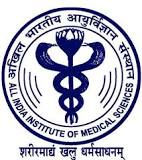ALL INDIA INSTITUTE OF MEDICAL SCIENCES

🇮🇳India
- Country
- 🇮🇳India
- Ownership
- Private
- Established
- 1956-01-01
- Employees
- 10K
- Market Cap
- -
- Website
- http://www.aiims.edu
India Launches First Indigenous HPV Test Kits for Cervical Cancer Screening
• Indigenously developed HPV test kits for cervical cancer screening were launched in Delhi, targeting the seven to eight most common cancer-causing HPV types specific to India's population.
• The RTPCR-based diagnostic kits, validated through collaborative research led by AIIMS Delhi, offer a cost-effective alternative to traditional Pap smears and HPV DNA tests for national cancer screening programs.
• With cervical cancer being the second most common cancer among Indian women and accounting for 25% of global mortality, these kits align with WHO's recommendation for HPV testing as the preferred screening method.
Chemoradiation Fails to Improve Survival in Resected Gallbladder Cancer: ACCELERATE Trial
• The phase 3 ACCELERATE trial found that adding chemoradiation (CRT) to chemotherapy did not improve relapse-free survival (RFS) in patients with resected gallbladder cancer.
• Median survival was 52.7 months, with a hazard ratio of 1.59 for RFS in the combination arm compared to chemotherapy alone.
• The trial, though the first prospective study on adjuvant CRT in gallbladder cancer, requires a larger sample size to validate these findings due to incomplete accrual.
TOPSPIN Study Reveals Effective Single-Pill Combinations for Hypertension in South Asians
The TOPSPIN study, conducted by the Centre for Chronic Disease Control in collaboration with AIIMS and Imperial College London, has demonstrated the effectiveness of three double anti-hypertensive pill combinations in South Asian populations with uncontrolled hypertension. The study found that all three combinations were equally effective and safe, achieving blood pressure control in approximately 70% of participants. This research provides a significant advancement in hypertension management for South Asians, offering clinicians a roadmap for treatment.
Camrelizumab and Apatinib Show Promise in Neoadjuvant Treatment of TNBC
• Camrelizumab plus chemotherapy significantly improved pathologic complete response (pCR) rates in early or locally advanced triple-negative breast cancer (TNBC).
• Apatinib combined with sintilimab and chemotherapy demonstrated a high pCR rate of 70.6% in early TNBC, suggesting synergistic effects.
• Both camrelizumab and apatinib regimens exhibited manageable safety profiles, supporting their potential as new neoadjuvant therapeutic options.
• Biomarker analysis in the apatinib study identified correlations between immune response and pCR, offering insights for predicting treatment efficacy.
Key Advances in Inflammatory Bowel Disease: New Therapies, Treatment Strategies, and Long-Term Data
• Early, intensive 'top-down' therapy with TNF blockers plus immunomodulators shows superior outcomes compared to the traditional 'step-up' approach for newly diagnosed Crohn's disease.
• Risankizumab (Skyrizi) and guselkumab (Tremfya) receive FDA approval for ulcerative colitis, offering new options for patients who have not responded well to conventional treatments.
• Research indicates intensified infliximab dosing does not improve outcomes in steroid-refractory acute severe ulcerative colitis, suggesting a need for alternative strategies.
• Long-term data reveals tulisokibart maintains clinical and endoscopic improvements in IBD patients, supporting its advancement to phase III trials.
EUS-Guided Celiac Plexus Block Shows Promise in Pancreatic Cancer Pain Management
• Endoscopic ultrasound-guided celiac plexus block (EUS-CPB) is being investigated for pain palliation in pancreatic cancer patients.
• A multi-center, randomized controlled trial is underway to evaluate the efficacy of EUS-CPB compared to standard pain management.
• The study aims to determine if EUS-CPB can reduce pain intensity and improve quality of life for patients with pancreatic cancer.
• Preliminary results suggest EUS-CPB could offer a valuable alternative or adjunct to traditional pain control methods.
BART Trial: Adjuvant Radiotherapy Shows Tolerable Toxicity Profile in Bladder Cancer
• The BART trial investigated adjuvant radiotherapy (ART) following radical cystectomy and chemotherapy in high-risk muscle-invasive bladder cancer (MIBC).
• Results indicated that ART did not significantly increase severe acute or late toxicity compared to observation alone.
• Grade 2 acute toxicities, mainly bowel-related, were more frequent in the ART arm but resolved without intervention.
• The study suggests ART is a safe and tolerable option for MIBC, with ongoing assessment for oncological efficacy.
Gemcitabine Shows Comparable Efficacy to Mitomycin C in Non-Muscle Invasive Bladder Cancer
• A randomized phase II trial compared intravesical gemcitabine to mitomycin C after resection of non-muscle invasive bladder cancer (NMIBC).
• Recurrence rates and time to recurrence were similar between gemcitabine and mitomycin C groups after one year of follow-up.
• Gemcitabine instillation was slightly less costly than mitomycin C, with comparable adverse event profiles observed in both groups.
• These findings suggest gemcitabine as a potential alternative to mitomycin C for immediate post-resection instillation in NMIBC.
© Copyright 2025. All Rights Reserved by MedPath
